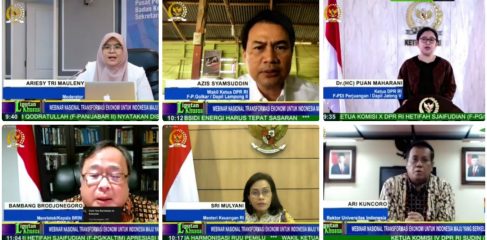National Webinar of the Research Center for the Secretariat General of the DPR RI, “Economic Transformation for a Sustainable, Advanced Indonesia”
Nino Eka Putra ~ PR of FEB UI
DEPOK – (18/11/2020) Dr. (HC) Puan Maharani, the Speaker of the House of Representatives of the Republic of Indonesia (DPR RI) opened a National Webinar organized by the DPR RI Secretariat General Expertise Body Research Center, with the theme “Economic Transformation for a Sustainable Advanced Indonesia” online, on Wednesday (18 / 11/2020).
The National Webinar presented several resource persons, including Dr. H. M. Azis Syamsuddin, Deputy Speaker of the Indonesian Parliament; Sri Mulyani Indrawati, Ph.D., Indonesian Minister of Finance; Prof. Ari Kuncoro, Ph.D., UI Rector; Prof. Bambang Brodjonegoro, Ph.D., Minister of Research and Technology/Head of the National Innovation Research Agency (Menristek/Head of National Agency for Research and Technology); and moderated by Dr. Ariesy Tri Mauleny.
Sri Mulyani Indrawati said that Indonesia will become a high-income country by 2045 if it could increase productivity and have high innovation. This high level of productivity must be supported by capable human resources and workforce. From the competitiveness index, Indonesia is a country that is close to being developed. However, currently the innovation capabilities, institutions and infrastructure capabilities are still considered weak and lacking. On the other hand, the current shift in the number of informal workers who are not productive is still a challenge. In this sense, technology is a way out that has a positive impact.

“Transformation is one of the efforts to strengthen competitiveness, especially in terms of human resources, including skills, capability and health. In addition, there is a need for simplification of regulations, thus increasing the efficiency of the bureaucracy and building good institutions. This must be implemented as we aim at becoming closer to the level of productivity competitiveness” said Sri Mulyani.
Ari Kuncoro explained that the role of universities in Indonesia’s economic transformation is to produce talents with cultural connectivity capabilities, and improve the national education curriculum at all levels, both general and vocational. The curriculum must be reorganized and competitive according to the times. This way, we can produce graduates with 4 literacies, that enable them to adapt and take part in society, namely basic literacy (reading, writing and mathematics), data, technology, and humans.

Ari said, the National Curriculum, which emphasizes planning skills, interpersonal skills, such as coordination, negotiation, confidence and a willingness to leave a comfortable zone, seems to help in explaining their success on the radar to become a member of the international supply chain. Even if still below the leading universities in Malaysia and Thailand, especially China which has entered the international supply chain, Indonesia is targeting higher education as a source of foreign exchange. At least, Indonesia has started to enter the international radar, one of which through the QS (Quacquarelli Symonds) and THE (Times Higher Education) ranking system.
International rankings are just an instrument. There is a positive correlation between the current account surplus and the international ranking of tertiary institutions in each country. “Top universities in Indonesia, including UI, have the task of increasing Indonesia’s exposure to the international world, both through international accreditation, research collaboration, teaching staff exchanges (inbound and outbound) as well as the flow of foreign students entering and international students abroad,” Ari said.
Bambang Brodjonegoro said that the national research and innovation framework focuses on appropriate technology, added value and commercialization, import substitution and increasing the level of domestic components (TKDN), as well as front line technology. This requires a triple helix, namely the participation of industry, government and academia.

According to Bambang, the startup coaching conducted by the Ministry of Research and Technology/National Agency for Research and Innovation is in the form of strengthening a conducive climate for innovation development in Indonesia. The Ministry/BRIN has fostered 1307 startups and potential startups since 2015. In addition, it also encourages the entrepreneurial ecosystem towards an innovation-based economy, which is a community program, namely knowledge (entrepreneurial mindset, employability skills), training in campus and industry, starting partners, and startups (successful entrepreneurs). (hjtp)
(am)








